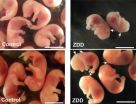(Press-News.org) People affected by binge eating, substance abuse and obsessive compulsive disorder all share a common pattern of decision making and similarities in brain structure, according to new research from the University of Cambridge.
In a study published in the journal Molecular Psychiatry and primarily funded by the Wellcome Trust, researchers show that people who are affected by disorders of compulsivity have lower grey matter volumes (in other words, fewer nerve cells) in the brain regions involved in keeping track of goals and rewards.
In our daily lives, we make decisions based either on habit or aimed at achieving a specific goal. For example, when driving home from work, we tend to follow habitual choices – our 'autopilot' mode – as we know the route well; however, if we move to a nearby street, we will initially follow a 'goal-directed' choice to find our way home – unless we slip into autopilot and revert to driving back to our old home. However, we cannot always control the decision-making process and make repeat choices even when we know they are bad for us – in many cases this will be relatively benign, such as being tempted by a cake whilst slimming, but extreme cases it can lead to disorders of compulsivity.
In order to understand what happens when our decision-making processes malfunction, a team of researchers led by the Department of Psychiatry at the University of Cambridge compared almost 150 individuals with disorders including methamphetamine dependence, obesity with binge eating and obsessive compulsive disorder, comparing them with healthy volunteers of the same age and gender.
Study participants first took part in a computerised task to test their ability to make choices aimed a receiving a reward over and above making compulsive choices. In a second study, the researchers compared brain scans taken using magnetic resonance imaging (MRI) in healthy individuals and a subset of obese individuals with or without binge eating disorder (a subtype of obesity in which the person binge eats large amounts of food rapidly).
The researchers demonstrated that all of the disorders were connected by a shift away from goal-directed behaviours towards automatic habitual choices. The MRI scans showed that obese subjects with binge eating disorder have lower grey matter volumes – a measure of the number of neurons – in the orbitofrontal cortex and striatum of the brain compared to those who do not binge eat; these brain regions are involved in keeping track of goals and rewards. Even in healthy volunteers, lower grey matter volumes were associated with a shift towards more habitual choices.
Dr Valerie Voon, principal investigator of the study, says: "Seemingly diverse choices – drug taking, eating quickly despite weight gain, and compulsive cleaning or checking – have an underlying common thread: rather that a person making a choice based on what they think will happen, their choice is automatic or habitual.
"Compulsive disorders can have a profoundly disabling effect of individuals. Now that we know what is going wrong with their decision making, we can look at developing treatments, for example using psychotherapy focused on forward planning or interventions such as medication which target the shift towards habitual choices."
INFORMATION: END
Creatures of habit: Disorders of compulsivity share common pattern and brain structure
2014-05-29
ELSE PRESS RELEASES FROM THIS DATE:
New laser sensing technology for self-driving cars, smartphones and 3-D video games
2014-05-29
WASHINGTON, May 29, 2014—A new twist on 3-D imaging technology could one day enable your self-driving car to spot a child in the street half a block away, let you answer your Smartphone from across the room with a wave of your hand, or play "virtual tennis" on your driveway.
The new system, developed by researchers at the University of California, Berkeley, can remotely sense objects across distances as long as 30 feet, 10 times farther than what could be done with comparable current low-power laser systems. With further development, the technology could be used to make ...
Parasitic fig wasps bore with zinc-hardened drill bit tips
2014-05-29
Female insects have one goal in life: to find the best place to lay their eggs. For fig wasps, that is the developing fruit of the luscious fig plant. However, when one particular parasitic fig wasp (Apocryta westwoodi grandi) descends onto a recently fertilised fruit, she has to bore her way through the tough unripe fig to find the larvae of other insects that are already developing within, which she will then parasitize to give her own eggs the best start. Fortunately, the insect's immensely long (7–8mm) and slender (~15 μm) ovipositor – which injects eggs into the ...
What shaped it, how old is it, and are they connected?
2014-05-29
Boulder, Colo., USA - Two articles recently published online for the journal LITHOSPHERE investigate the influence of climate, erosion, and tectonics on the lay of the land in the Bolivian Andes. Nicole Gasparini of Tulane University and Kelin Whipple of Arizona State University tackle rainfall patterns, rock uplift, and the distribution of crustal deformation caused by tectonics. In both studies, they conclude that tectonics win out over rainfall when it comes to shaping Earth' surface in the area.
Other new articles cover (1) isotopic dating of volcanic rocks in the ...
UT Arlington nursing professor studying online students' stress, sense of belonging
2014-05-29
As a nursing professor assigned to one of UT Arlington's first online master's degree courses, Ronda Mintz-Binder had a stake in learning to motivate students online. Now, she's building on her experience with a research project that will help other professors.
Mintz-Binder, who holds a master's degree in psychiatric/mental health nursing and a doctorate in nursing educational leadership, received two grants from the Dallas-based education company Academic Partnerships to initiate a multi-year study comparing the experiences of on-campus and online master's degree students. ...
Microalgae capable of assimilating the NH3 resulting from the management of agrifood waste
2014-05-29
The Basque Institute for Agricultural Research and Development, Neiker-Tecnalia, the public body that reports to the Sub-Ministry for Agriculture, Fisheries and Food Policy of the Government of the Basque Autonomous Community, has confirmed the capacity of Chlamydomonas acidophila microalgae to absorb ammoniacal nitrogen present in the effluent generated in the digestion of organic waste coming from the agri-food sector. These algae can grow in these liquids and assimilate the ammonium, which prevents this gas from being volatilised in the form of ammonia (NH3) and contaminating ...
Dentists' knowledge, confidence tied to care for scleroderma patients
2014-05-29
What: A survey of dentists in Massachusetts suggests that their confidence in treating patients with scleroderma may be related to their familiarity with the autoimmune disease. Dentists who reported feeling knowledgeable about scleroderma felt more prepared to provide care to patients with scleroderma, when compared to peers who did not feel as knowledgeable. Providing education to dentists may improve patient satisfaction and access to care, while simultaneously increasing dentists' knowledge and comfort.
Background: Scleroderma, derived from the Greek words for "hard ...
Zinc deficiency before conception disrupts fetal development
2014-05-29
Female mice deprived of dietary zinc for a relatively short time before conception experienced fertility and pregnancy problems and had smaller, less-developed fetuses than mice that ingested zinc during the same times, according to researchers in Penn State's College of Agricultural Sciences.
The findings have implications for human reproduction, scientists suggest.
Going without zinc prior to ovulation had marked effects on the mice's reproductive functions. Zinc deficiency caused a high incidence of pregnancy loss, and embryos from the zinc-deficient diet group were ...
Spruce up your selfie
2014-05-29
CAMBRIDGE, Mass-- Celebrated portrait photographers like Richard Avedon, Diane Arbus, and Martin Schoeller made their reputations with distinctive visual styles that sometimes required the careful control of lighting possible only in the studio.
Now MIT researchers, and their colleagues at Adobe Systems and the University of Virginia, have developed an algorithm that could allow you to transfer those distinctive styles to your own cellphone photos. They'll present their findings in August at Siggraph, the premier graphics conference.
"Style transfer" is a thriving area ...
Having children is contagious among high school friends during early adulthood
2014-05-29
WASHINGTON, DC, May 22, 2014 — A new study suggests that having children is contagious among female high school friends during early adulthood.
"The study shows the contagion is particularly strong within a short window of time: it increases immediately after a high school friend gives birth, reaches a peak about two years later, and then decreases, becoming negligible in the long-run," said co-author Nicoletta Balbo, a postdoctoral fellow at the Carlo F. Dondena Centre for Research on Social Dynamics at Bocconi University in Italy. "Overall, this research demonstrates ...
Where one lives matters in the relationship between obesity and life satisfaction
2014-05-29
WASHINGTON, DC, May 27, 2014 — A new study suggests that how one compares weight-wise with others in his or her community plays a key role in determining how satisfied the person is with his or her life.
"The most interesting finding for us was that, in U.S. counties where obesity is particularly prevalent, being obese has very little negative effect on one's life satisfaction," said study co-author Philip M. Pendergast, a doctoral student in sociology at the University of Colorado-Boulder. "In addition, we found that being 'normal weight' has little benefit in counties ...


